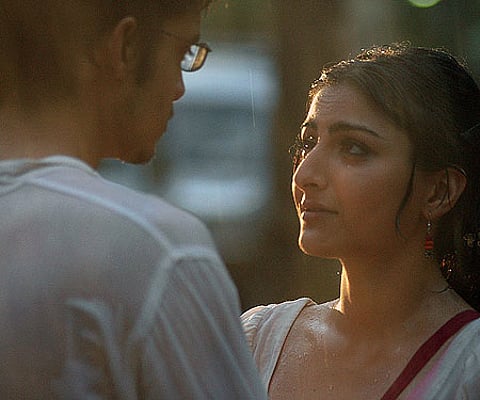

'Chaurahen' (Hindi)
Director: Rajshree Ojha
Cast: Victor Banerjee, Roopa Ganguli, Arundhati Nag, Nedumudi Venu, Zeenat Aman, Soha Ali Khan, Suchitra Pillai
Three years before she directed shopping-partying-dating orgy ‘Aisha’, Rajshree Ojha made an intense, moody film that’s seen light of day thanks to PVR Cinemas Director’s Rare initiative for independent cinema. ‘Chaurahen’ (Crossroads), fortunately, doesn’t have to do with teenage angst.
There are three strands in the story, each of which deals with the idea of coming to terms with loss. In Kolkata, Dr. Bose (Victor Banerjee) and his wife (Roopa Ganguli) play a middle-aged couple in a childless marriage, which could be wrecked by a young Frenchwoman played by Kiera Chaplin (ever since he was cuckolded in ‘Ghare Baire’, Banerjee seems to have been avenging himself against his screen wives).
In Kochi, retired Army man Mr. Nair (Nedumudi Venu) and his wife (Arundhati Nag) are overcoming the loss of their soldier son Keshy (Shayan Munshi), in the looming absence of their two other children (Suchitra Pillai and Karthik Kumar).
In Mumbai, writer Farooq Vacha (Ankur Khanna) has converted his house to a memorial for his parents.
The film has a slick opening, and intelligent cinematography by Tobias Datum. But the assumption that a multiplex audience won’t “get” stuff without explanation works to its detriment. For instance, the effect of the heavy silences is dampened when three characters speak of “the silences”.
In the process, things that actually need explaining are forgotten. When did Keshy die? Kargil? There are times when it appears to have been weeks since, and others when years seem to have passed. What happened to the Bose couple’s daughter? And why does Soha Ali Khan put on a horrendously fake British accent?
Based on the short stories of Nirmal Verma, the film has a solid foundation. But it’s let down by some of its dialogues, the odd miscasting, and clumsy execution at times. Certain lines do make one cringe. Ankur Khanna looks too young to be a writer – or Soha’s boyfriend. That said, he’s the only one of the younger lot who has truly grasped his character.
Some of the lines are evocative. I especially liked this, spoken naturally by Khanna: “The worse her memory got, the more concerned she was about mine.”
But several of the other actors tend to recite their lines, rather than think them. In the case of the Kochi family, there are too many instances when they’re cheerful and suddenly get morose.
So delicate a switch requires fine acting, and Nedumudi Venu is the only one who delivers. Brilliant stage actress as she is, Arundhati Nag doesn’t handle the emotional transition too well here. However, there’s one touching scene, where Mr. Nair gives his son the jacket he’s been wearing. “I already have one, Achan,” the son says. “It’s okay, have one extra also,” the father smiles, welling up.
Roopa Ganguli and Victor Banerjee are wonderful, saying far more with their expressions than their words. There’s one particularly beautiful scene where she tells him that among the books he has disposed of was one he had gifted her when she gave birth to their daughter, inscribed ‘To the mother of my child’.
There are a few marks of the amateur filmmaker. The end appears contrived, as if Ojha felt compelled to use a cinematic device. And some scenes could have done with a fuller explanation.
Here’s one: How would you react if your brother were to tell you he’s gay? Maybe you’d grab his cigarette. Maybe you’d ask if Amma knows. But, would you grin, hug him and wish him luck without any more questions? Wouldn’t you want to know when he knew he was gay? And whether he’s ever dated girls? Who is the lover, what does he do?
The Verdict: There’s promise in the film, and I’d like to see what Rajshree Ojha could do with this genre in a few years.